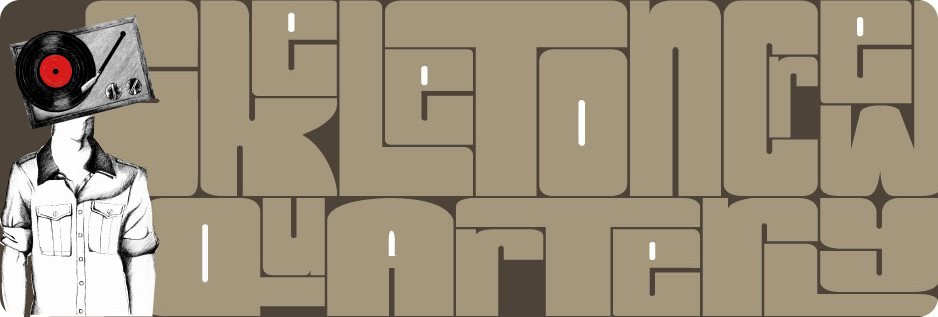
Two months back, I mentioned that SCQ was cooking up a new feature that would spotlight under-the-radar labels that are, in fact, quite awesome. Well, it didn’t take very long to realize that column idea was nearly identical to Embers From the Underground, the young feature that interviews artists and discusses their recent work. So here SCQ presents a mammoth edition of EFTU that focuses on Fixture Records, the Montreal-based imprint that helps beat the heart of true indie music.
Catch up with Tessa Smith and Conor Prendergast, co-founders of Fixture Records, who tag-team SCQ's interview and don’t forget to check out some of their fine releases courtesy of Omon Ra, Cresting, Postcards and Dirty Beaches (reviews and links below)…
SCQ: Where were you and what were you doing when you decided to form a record label? Why Fixture Records?
Tessa & Conor: In the summer of 2007, we started talking about a cassette project where we would pair visual artists up with bands. That was the initial idea. Later that year, our band, Brave Radar, finished a record. We were working on the CD cases for that and researching what to do with it after we made the CDs. The cassette thing hadn’t happened, and we realized that what we were doing then was being a label anyway. After that, we helped some friends with their first albums, Dirty Beaches and Postcards. It sort of just went from there.
For the name, we wanted something that sounded classy, like Atlantic or Stax, something like that. We googled Top Notch and it was already taken. Probably for the best. Fixture was a suggestion by our roommate at the time. I think he was lying on his back looking up at a light fixture in his room when he said it.
SCQ: Peaking in on Fixture Records' tumblr is a particular treat, where you frequently post pictures of late-nights spent crafting record/download sleeves, live videos or basement studio-sessions and lots of audio streams. How crucial of a role has the internet played in the growth of your label?
Tessa & Conor: The internet lets us sell our records without having distribution or a brick-and-mortar shop. It's much easier to find a small international audience and be sustained by that while promoting things in a way that feels natural to us, i.e. not having to release huge numbers of things or do big ad campaigns or anything. That small audience could grow in the future and we could still keep doing things our way.
SCQ: What were your ambitions when Fixture Records first started out? Have any of these goals changed over time?
Tessa & Conor: In the beginning, we thought of the label as a first base kind of step for bands we liked and friends to make records and have somewhere to put them. That’s still really important. Deciding to release something for us is like making a commitment to that recording and saying it’s just as legitimate as anything.
It’s always been important for us to put care into the packaging, digital design, and promotional materials on a handmade, small-run scale. We’ve gotten better at the physical production stuff, so now we’re thinking more about fun and weird projects that we can develop using those skills.
With every release we seem to re-evaluate our ideas. Everyone’s thinking about what’s happening to records and we think a lot about those kinds of questions. For us, we really have nothing to lose, so it’s a really exciting time to be putting stuff out and experimenting with formats.
 SCQ: Although creating wildly diverse records, most every artist who calls Fixture Records home shares a certain experimental/lo-fi aesthetic. Is it your intention to maintain a roster that boasts a distinctly “Fixture sound” or do you plan to expand into new sonic directions?
SCQ: Although creating wildly diverse records, most every artist who calls Fixture Records home shares a certain experimental/lo-fi aesthetic. Is it your intention to maintain a roster that boasts a distinctly “Fixture sound” or do you plan to expand into new sonic directions?Tessa & Conor: Initially, we put out a bunch of records in a row that were the first albums of our friends` bands, so there was probably a social aspect to any sort of similarity in sound. But generally, what we both like is pop music. That’s what we’re drawn to, stuff with hooks and melody and a certain immediacy, no matter what the genre.
We have no real allegiance to any aesthetic or scene, so to speak, which makes it really easy to decide what to release. We just put out what we like.
Someone wrote us a while ago after buying a few of our records to say it sounded like the artists were making music they wanted to make, rather than what they should or could. We like that.
SCQ: What’s on Fixture’s agenda for 2010?
Tessa & Conor: We just finished a double cassette, Volumes I & II, by an Ann Arbor band, called Telephone Callers (Myspace). They`re our first non-Canadian band. Next up, we’re working on a 7inch by Bernardino Femminielli, an EP by Mavo, a mixed media sci-fi compilation, and we’ve got a few other things on the back burner.
Check us out at: www.fixture-records.com
Thanks!!














